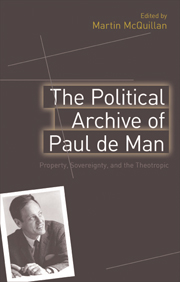Book contents
- Frontmatter
- Contents
- List of Abbreviations
- Acknowledgements
- Notes on Contributors
- Introduction: Broken Promises: Rousseau, de Man and Watergate
- 1 Lovence in Rousseau's Julie ou la Nouvelle Héloïse
- 2 Reading Spectacles in Rousseau's Letter to d'Alembert
- 3 The Utter Misery of the Human Mind: Apotropaic and Theotropic in de Man's Rousseau
- 4 Rhetoric and Rausch: de Man on Nietzsche on Value and Style
- 5 Theotropic Logology: J. Hillis Miller, Paul de Man and Kenneth Burke
- 6 Normativity, Materiality and Inequality: The Politics of the Letter in Paul de Man
- 7 Inscribing the Political: Paul de Man and the Wild Art of Letter Writing
- 8 Mistake in Paul de Man: Violent Reading and Theotropic Violence
- 9 Lightstruck: ‘Hegel on the Sublime’
- 10 De Man vs. ‘Deconstruction’: or, Who, Today, Speaks for the Anthropocene?
- 11 Paul de Man at Work: What Good is an Archive?
- 12 DNA: de Man's Nucleic Archive
- 13 Sovereign Debt Crisis: Paul de Man and the Privatization of Thought
- Appendix: Nietzsche I: Rhetoric + Metaphysics
- Index
Introduction: Broken Promises: Rousseau, de Man and Watergate
Published online by Cambridge University Press: 05 August 2013
- Frontmatter
- Contents
- List of Abbreviations
- Acknowledgements
- Notes on Contributors
- Introduction: Broken Promises: Rousseau, de Man and Watergate
- 1 Lovence in Rousseau's Julie ou la Nouvelle Héloïse
- 2 Reading Spectacles in Rousseau's Letter to d'Alembert
- 3 The Utter Misery of the Human Mind: Apotropaic and Theotropic in de Man's Rousseau
- 4 Rhetoric and Rausch: de Man on Nietzsche on Value and Style
- 5 Theotropic Logology: J. Hillis Miller, Paul de Man and Kenneth Burke
- 6 Normativity, Materiality and Inequality: The Politics of the Letter in Paul de Man
- 7 Inscribing the Political: Paul de Man and the Wild Art of Letter Writing
- 8 Mistake in Paul de Man: Violent Reading and Theotropic Violence
- 9 Lightstruck: ‘Hegel on the Sublime’
- 10 De Man vs. ‘Deconstruction’: or, Who, Today, Speaks for the Anthropocene?
- 11 Paul de Man at Work: What Good is an Archive?
- 12 DNA: de Man's Nucleic Archive
- 13 Sovereign Debt Crisis: Paul de Man and the Privatization of Thought
- Appendix: Nietzsche I: Rhetoric + Metaphysics
- Index
Summary
It was on working with Rousseau that I felt I was able to progress from purely linguistic analysis to questions which are really already of a political and ideological nature.
(RT 121)On sabbatical from Yale University, Paul de Man spent the academic year 1973-74 in Zurich, where he had until 1970 held the Chair of Comparative Literature. The product of this sabbatical was the manuscript entitled Textual Allegories, an extended reading of the question of figurality in Rousseau, which was to provide the material for several published articles and later the second half of the last monograph published in de Man's lifetime, Allegories of Reading. Textual Allegories is then a draft of the thinking that will become synonymous with de Man and what is both correctly and so-problematically called ‘American deconstruction’. The shape of Textual Allegories follows exactly the chapter plan that appears in Allegories of Reading, starting from page 1 with a chapter on ‘The Metaphor of the Self, corresponding to Chapter 8 of Allegories, ‘Self (Pygmalion)’, running though chapters on Julie, the Profession de foi, The Social Contract and Confessions. An additional un-numbered chapter entitled ‘Theory of Metaphor in Rousseau's Second Discourse’ completes the draft of Allegories, corresponding to Chapter 7 of that book, ‘Metaphor’.
- Type
- Chapter
- Information
- The Political Archive of Paul de ManProperty, Sovereignty and the Theotropic, pp. 1 - 12Publisher: Edinburgh University PressPrint publication year: 2012



